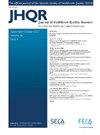Analysis of protocol adherence and outcomes of an enhanced recovery program in colorectal surgery after 5 years of implementation
IF 1
Q4 HEALTH CARE SCIENCES & SERVICES
引用次数: 0
Abstract
Introduction
Enhanced recovery program (ERAS program) have revolutionized the world of surgery by reducing postoperative complications and hospital stays. Greater adherence to the protocol results in better outcomes; however, adherence often declines over time. The main objective of this study is to analyze the adherence rate to ERAS strategies and the outcomes of an ERAS colorectal (CRC) program five years after its implementation.
Methodology
This is a descriptive observational study comparing two groups of patients undergoing scheduled CRC surgery under an ERAS program at University Hospital. The first group (ERAS) includes patients operated on during the period immediately following the implementation of the protocol (January 2017–June 2018), while the second group (ERAS 5) includes patients operated on five years after the implementation (January 2022–June 2022).
Results
An increase in the adherence rate to ERAS strategies was observed (88.2% in ERAS vs. 84.2% in ERAS 5, p 0.003), as well as a reduction in healthcare-associated infections (HAIs) (9% in ERAS vs. 25.2% in ERAS 5, p 0.001) and surgical site infections (6% in ERAS vs. 18.2% in ERAS 5, p 0.002). No differences were found in other postoperative complications, functional recovery, average length of stay, and readmission rates.
Conclusions
After five years of implementing an ERAS protocol for CRC in our hospital, we have managed to maintain a high adherence rate to ERAS strategies. There has been a significant reduction in HAIs and surgical site infections.
实施5年后结直肠手术强化恢复方案的依从性和结果分析。
简介:增强恢复计划(ERAS计划)通过减少术后并发症和住院时间彻底改变了外科世界。更严格地遵守治疗方案会带来更好的结果;然而,坚持往往会随着时间的推移而下降。本研究的主要目的是分析ERAS策略的依从率以及ERAS结直肠癌(CRC)计划实施五年后的结果。方法:这是一项描述性观察性研究,比较了两组在大学医院ERAS计划下接受CRC手术的患者。第一组(ERAS)包括在方案实施后立即进行手术的患者(2017年1月至2018年6月),而第二组(ERAS 5)包括实施五年后(2022年1月至2022年6月)进行手术的患者。结果:观察到ERAS策略的依从率增加(ERAS组为88.2%,ERAS 5组为84.2%,p 0.003),医疗保健相关感染(HAIs) (ERAS组为9%,ERAS 5组为25.2%,p 0.001)和手术部位感染(ERAS组为6%,ERAS 5组为18.2%,p 0.002)。其他术后并发症、功能恢复、平均住院时间和再入院率均无差异。结论:在我院实施了5年的CRC ERAS方案后,我们成功地保持了ERAS策略的高依从率。HAIs和手术部位感染显著减少。
本文章由计算机程序翻译,如有差异,请以英文原文为准。
求助全文
约1分钟内获得全文
求助全文
来源期刊

Journal of Healthcare Quality Research
Medicine-Health Policy
CiteScore
1.70
自引率
8.30%
发文量
83
审稿时长
57 days
期刊介绍:
Revista de Calidad Asistencial (Quality Healthcare) (RCA) is the official Journal of the Spanish Society of Quality Healthcare (Sociedad Española de Calidad Asistencial) (SECA) and is a tool for the dissemination of knowledge and reflection for the quality management of health services in Primary Care, as well as in Hospitals. It publishes articles associated with any aspect of research in the field of public health and health administration, including health education, epidemiology, medical statistics, health information, health economics, quality management, and health policies. The Journal publishes 6 issues, exclusively in electronic format. The Journal publishes, in Spanish, Original works, Special and Review Articles, as well as other sections. Articles are subjected to a rigorous, double blind, review process (peer review)
 求助内容:
求助内容: 应助结果提醒方式:
应助结果提醒方式:


